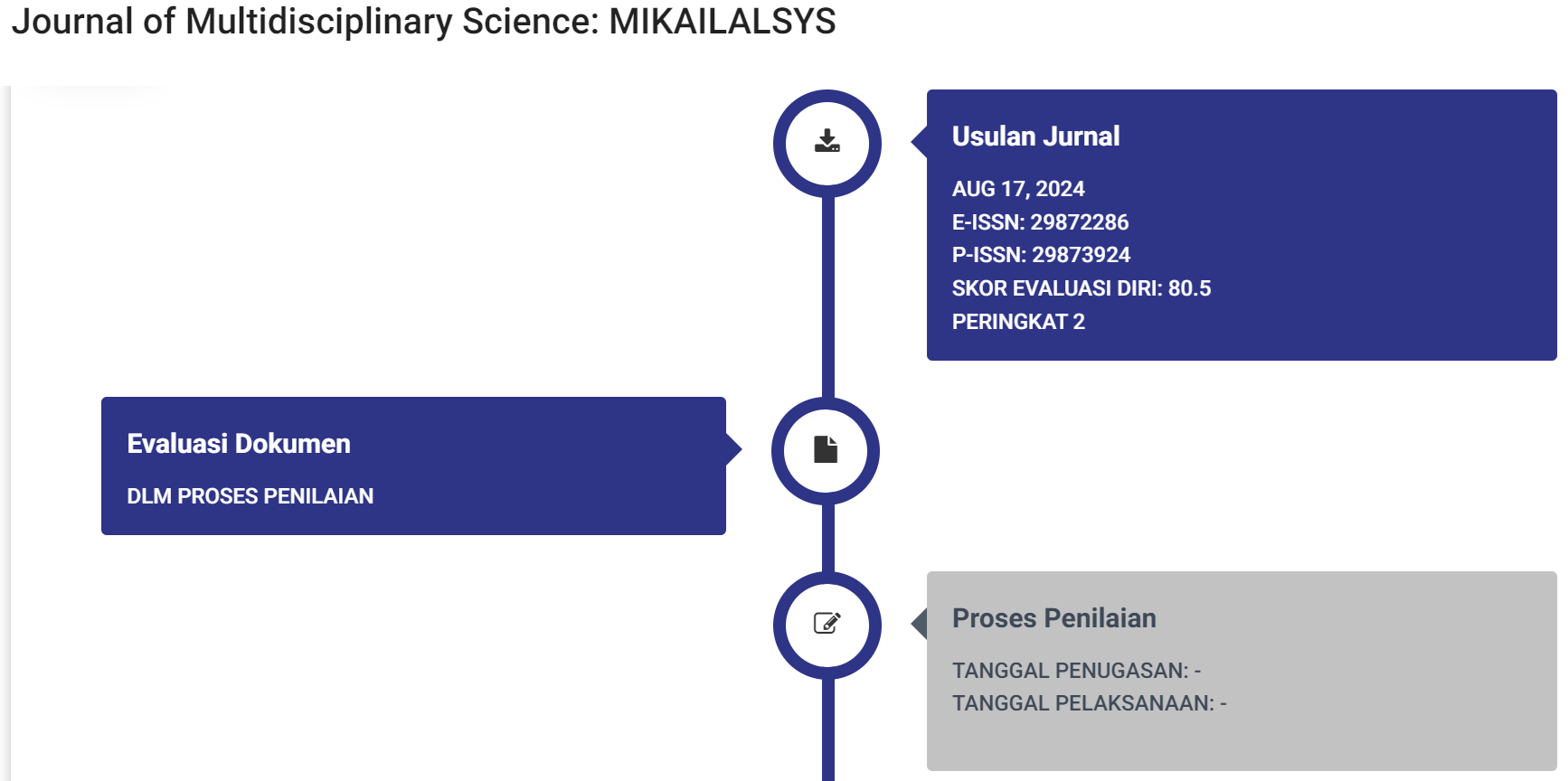Attitude of Mathematics Teachers Towards the Use of Activity Based and Guided Discovery Strategies in Improving Students Understanding of Geometric Concepts
 Digital Object Identifier:
10.58578/mikailalsys.v2i3.3762
Digital Object Identifier:
10.58578/mikailalsys.v2i3.3762
Please do not hesitate to contact us if you would like to obtain more information about the submission process or if you have further questions.

Abstract
The study aims to examine attitude of mathematics teachers towards the use of Activity Based teaching strategy and Guided discovery teaching strategy in improving students’ understanding of Geometric concepts. The study used survey design with half of the students (50) were subjected to Activity based teaching strategy and the remaining half were subjected to guided discovery teaching strategy (50) making a sample size of 100 students for the research study. A total of 26 mathematics teachers were used for the study, where 13 teachers were those who employed guided discovery teaching strategy and the remaining 13 were subjected to answer questions based on their attitude towards using activity-based teaching strategy to improve students understanding of geometric concepts known as Mathematics Teachers Attitude Test (MTAT). The attitudinal scale was determine using Likert 4 point scale for SA (strongly Agree), A (Agree), D (Disagree) and SD (Strongly Disagree) respectively. However, the 100 students were split into two groups and questions in selected areas of geometry were formulated by the researchers also known as Students Geometric Achievement Test (SGAT). The researchers used simple random sampling to select the 100 students based on the use of guided discovery teaching strategy and activity based teaching strategy in Zing LGA, Taraba State, Nigeria by their Mathematics Teachers. The method used for data analysis is mean scores, standard deviation and t-test distribution. Results of the study revealed that mathematics teachers of the study area have interest in the use of Activity based teaching strategy and Guided discovery teaching strategy to improve students understanding of geometric concepts. Teachers believe in this study that students do not feel boring when guided discovery teaching strategy is used in teaching geometric concepts to them. At 5% level of significance it was revealed further that, there is no significant difference in the Attitude of mathematics teachers on the use of Activity based teaching and guided discovery teaching strategies to improve students understanding of geometric concepts. It was recommended in this study that teachers should endeavor to employ the two selected teaching strategies in other to improve students understanding of geometric concepts in Zing local government Area.




Citation Metrics:

Downloads

Authors retain copyright and grant the journal right of first publication with the work simultaneously licensed under a Creative Commons Attribution-NonCommercial-ShareAlike 4.0 International License that allows others to share the work with an acknowledgement of the work's authorship and initial publication in this journal.
References
Adegun, I.K & Adegun, B.O (2013). Students and teachers’ views of difficult areas in mathematics syllabus: Basic Requirement for science and engineering education. Journal of Education and Practice, 4(12), 2013, 235-243.
Adolphus, F. (2011). Problems of Teaching and Learning of Geometry in Secondary Schools in Rivers State, Nigeria. International Journal of Emerging Sciences, 1(2), 143-152
Ayinla, J.O, (2011). Effects of Teachers instructional strategy pattern on senior school students’ Performance in mathematics word problem in Ondo, Nigeria, Unpublished M. Ed. Thesis, University of Ilorin,Ilorin, Nigeria, 2011.
Bahadır, E., & Özdemir, A. Ş. (2013). The effects of dramatization as a teaching strategy of integer numbers on the achievement and retention levels of students. International Journal Social Science Research, 2(2), 114-136
Damayanti, M. A., krisdiana, I., & Setyansah, R. K. (2019). Pengembangan media pembelajaran berbasis tutorial pada materi bangun ruang sisi datar untuk meningkatkan prestasi belajar peserta didik kelas viii mts negeri kota madiun. Prosiding silogisme, 1(1)
Eze, J. E. (2011). A Practical Teaching and Learning of Mathematics in Normadic Schools.
Fabiyi, T.R (2017). Geometry Concepts in Mathematics Perceived Difficult To Learn By Senior Secondary School Students in Ekiti State, Nigeria. IOSR Journal of Research & Method in Education (IOSR-JRME.
Fonna, M., & Mursalin, M. (2019). Using of wingeom software in geometry learning to improving the of mathematical representation ability. Malikussaleh journal of mathematics learning (mjml), 1(2), 40-43.
Luzviminda J.A, Rene R.B & Marc D. G (2015). The Effect of group guided Discovery Approach on the performance of students in Geometry. International journal of multidisciplinary Research and Modern Education (IJMRME). Vol. I, Issue II, 2015.
Rohendi, D., Septian, S., & Sutarno, H. (2018). The use of geometry learning media based on augmented reality for junior high school students. In iop conference series: materials science and engineering (vol. 306, no. 1, p. 012029). Iop publishing.
Slavin, R. E. (2018). Educational psychology: theory and practice. New york: pearson.
Sutman, F. X., Schmuckler, J. S., & Woodfield, J. D. (2010). The science quest: using inquiry/Discovery to enhance student learning, grades 7-12. John wiley & sons.
Siregar, N. C., Rosli, R., & Maat, S. M. (2019). Development of the D-Geometry Module Based on Discovery Learning. International Journal of Academic Research in Progressive Education and Development, 8(3), 99–109
Telima A, (2011). Problems of teaching and learning of geometry in secondary schools in River State, Nigeria. International Journal of Emerging Science, 1(2), 2011, 143-152

























